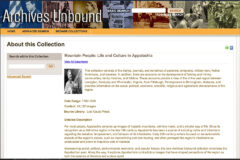Mountain People: Life and Culture in Appalachia is a small collection that is part of the Gale (a division of Cengage Learning) “Archives Unbound” series. Consisting of just more than 42,000 images, the collection covers the period 1700-1950 and “explores Appalachia’s contradictory images that have shaped perceptions of the region as both the essence of America and a place apart,” according to Gale. As if taking to heart historian Tim Hitchcock’s admonishment that in doing archival research “we are unconsciously led to give an unwarranted prominence to the institutions of past societies,”1 the Mountain People collection presents mostly diaries, journals and other writings of emigrants, travelers, Native Americans and others who lived in or passed through Appalachia.
Overview
Searching within the Mountain People collection may be done by keyword or, as in other “Archives Unbound” collections, through a limited set of metadata (full text, document title, author, place name, or document number). Searches may also be limited by using Boolean operators and by defining a collection, year, or language.

The digital collection was assembled from the entirety of the First Three Centuries of Appalachian Travel microfilm published by Lost Cause Press, with selected titles also drawn from collections of travel writing about the American south and from Kentucky Culture: A Basic Library of Kentuckiana.
The interface is simple. A keyword or metadata search will return a list of titles and clicking on those will present the user with the title page of the item. A clickable list of relevant pages where the search term may be found is provided in a navigation box. The user also is able here to refine the search using three different degrees of fuzzy logic. The interface also allows for full screen and split screen views. Tools allow the user to rotate, crop, annotate, highlight, and draw lines on the PDF image, although the latter three functions did not work properly for us. While we could print pages, any such markings were lost.
The value of the collection is the unusual nature of the documents. It is clearly of value for historians and folklorists seeking information on the people and environment of Appalachia, especially during a period when white settlers first came into the region. The collection reveals the tension of its inhabitants in an area that could be described as an American borderland: between Native and European, north and south, rural and urban, white and black, rich and poor, traditional and modern.
What is missing is a deeper explanation by the publisher about how the original collection was assembled or the technology and strategy behind the digitization process.
Facts
Date range: 1700-1950
Publisher: Gale (Cengage Learning)
Publisher “about” page: Available to users with institutional access
Object type: Books, diaries, journals
Exportable image: Yes
Facsimile image: Yes
Full text searchable: Yes
Titles list links: Click on “View All Documents” in the collection’s home page, which is available to users with institutional access.
History/Provenance
Original catalog: The entirety of First Three Centuries of Appalachian Travel, originally published by Lost Cause Press; selected titles from Travels in the Old South I, II, & III: 1607-1860; Travels in the New South I & II, 1865-1950; and Kentucky Culture: A Basic Library of Kentuckiana.
Digitized from microfilm: Yes
Reviews
None available.
Access
Mountain People: Life and Culture in Appalachia is part of the “Archives Unbound” series marketed by Gale. It may be accessed through institutional subscribers.
Information from publisher
An overview of the “Archives Unbound” series may be found by visiting the Cengage Learning website at gale.com/primary-sources/archives-unbound.
Citing
Information about citing a particular document in the Mountain People collection is available within the digital archive by clicking on “Full citation,” which will display an MLA-formatted citation.
1. Tim Hitchcock, “Digital Searching and the Reformulation of Historical Knowledge,” in Mark Greenglass and Lorna Hughes, eds., The Virtual Representation of the Past (Farnham: Ashgate, 2008), 81-90.
Accessed on 25 Apr 2024.
The article may be found online at https://straumanis.com/2016/mountain-people/.
